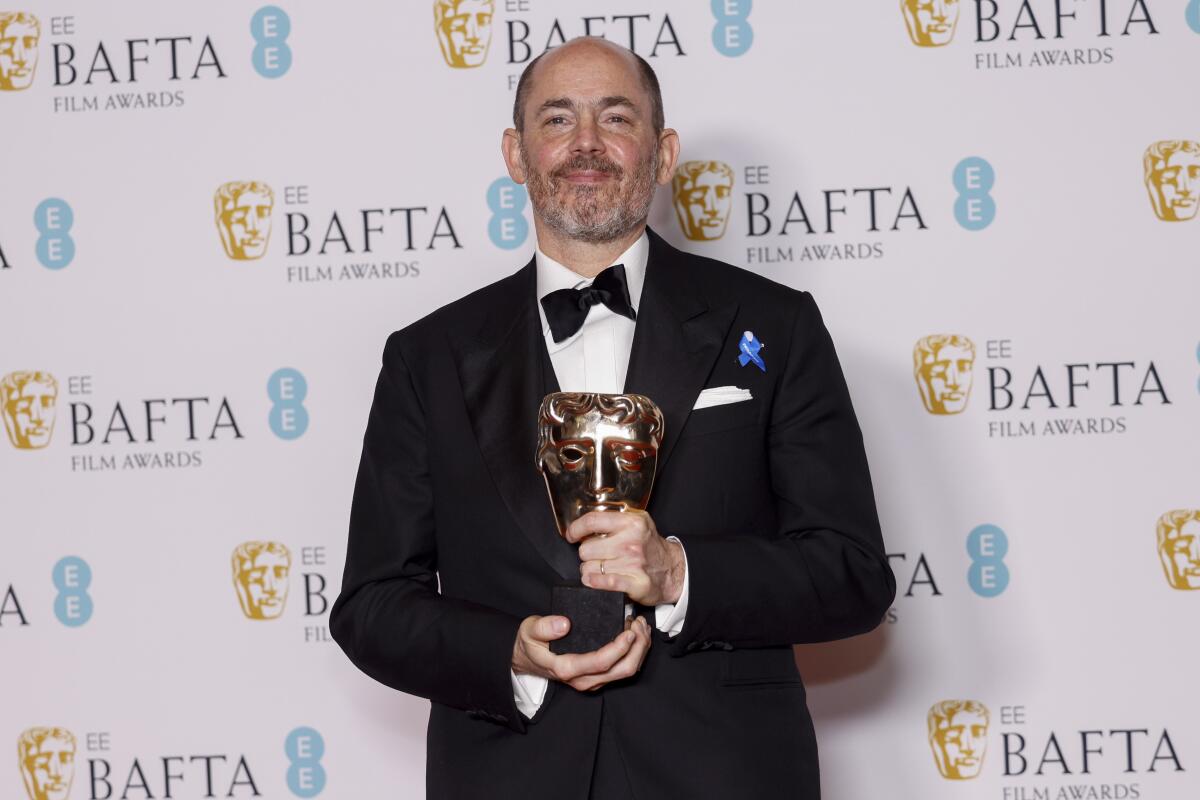‘All Quiet’ wins 7 BAFTAs, including best film, at U.K. awards

- Share via
LONDON — The antiwar German-directed movie “All Quiet on the Western Front” won seven prizes, including best picture, at the British Academy Film Awards on Sunday, building the somber drama’s momentum as awards season rolls toward its climax at next month’s Oscars.
Irish tragicomedy “The Banshees of Inisherin” and rock biopic “Elvis” took four prizes each.
“All Quiet,” a visceral depiction of life and death in the World War I trenches, won Edward Berger the directing award. Its other trophies included adapted screenplay, cinematography, score, sound and best film not in English.
Austin Butler was a surprise winner in acting for “Elvis.” Baz Lurhmann’s flamboyant musical also won trophies for casting, costume design, and hair and makeup. Cate Blanchett won the actress prize for Todd Field’s orchestral drama “Tár.”
Martin McDonagh’s “Banshees,” the bleakly comic story of a friendship gone sour, was named best British film.
Acting, directing, films and more — the Emerald Isle has ties to 14 nominations this Oscar season
“Best what award?” joked McDonagh of the film, which was shot in Ireland with a largely Irish cast and crew. It has British funding, and McDonagh was born in Britain to Irish parents.
“Banshees” also won for McDonagh’s original screenplay, and took awards for Kerry Condon as supporting actress and Barry Keoghan for supporting actor.
The prizes — officially the EE BAFTA Film Awards — are Britain’s equivalent to Hollywood’s Academy Awards and are watched closely for hints of who may win at the Oscars on March 12.
Madcap metaverse romp “Everything Everywhere All at Once” — the Academy Awards’ front-runner — was the night’s big loser, winning just one prize from its 10 BAFTA nominations, for editing.
Actor Richard E. Grant was a suave and self-deprecating host — with support from TV presenter Alison Hammond — for the ceremony at London’s Royal Festival Hall, where the U.K.’s movie academy heralded its strides to become more diverse but said there was more to be done.
Grant joked in his opening monologue about the infamous altercation between Will Smith and Chris Rock at last year’s Oscars.
“Nobody on my watch gets slapped tonight,” he said. “Except on the back.”
Guests and presenters walking the red carpet on the Thames’ South Bank included Colin Farrell, Ana de Armas, Eddie Redmayne, Brian Cox, Florence Pugh, Catherine Zeta-Jones, Cynthia Erivo, Julianne Moore and Lily James.
Heir to the throne Prince William, who is president of Britain’s film and television academy, was in the audience alongside his wife, Kate. William wore a tuxedo with black velvet jacket, while Kate dressed in a floor-length Alexander McQueen dress that she also wore to the 2019 BAFTAs.
Helen Mirren paid tribute to William’s grandmother, Queen Elizabeth II, who died in September. Mirren, who portrayed the late monarch onscreen in “The Queen” and onstage in “The Audience,” called Elizabeth “the nation’s leading lady.”
Britain’s film academy introduced changes to increase the awards’ diversity in 2020, when no women were nominated for directing for the seventh year running and all 20 nominees in the lead and supporting performer categories were white.
This year there were 11 female directors up for awards across all categories, including documentary and animated films. But just one of the main best-director nominees was female: Gina Prince-Bythewood for “The Woman King.”
BAFTA chair Krishnendu Majumdar said the academy’s soul-searching had been “a necessary and humbling process.” He said the “vital work of leveling the playing field” would continue.
“West Side Story” star Ariana DeBose opened the show by performing “Sisters Are Doin’ it for Themselves,” with an added rap shoutout to some of the nominated women, including Michelle Yeoh, Cate Blanchett and Viola Davis.
Blanchett said it had been “an extraordinary year for female performers. To be counted among them is really special.”
It was a strong year for Irish actors at the BAFTAs, with Daryl McCormack up for the BAFTA Rising Star award — though he lost to Emma Mackey — and Condon, Keoghan, Farrell and Brendan Gleeson all getting acting nominations for “Banshees.”
McCormack hailed the event as “the Irish BAFTAs.”
“It is a small country, but to see the talent that comes out of it is quite amazing,” he said.
Three-time Oscar winner Sandy Powell became the first costume designer to be awarded the academy’s top honor, the BAFTA fellowship.
The harsh world outside showbiz intruded on the awards when Bulgarian journalist Christo Grozev, who works for investigative website Bellingcat, said he was not allowed to attend the awards because of a risk to public security. He features in “Navalny,” a film about jailed Russian opposition politician Alexei Navalny that won the BAFTA for documentary.
“Navalny” producer Odessa Rae dedicated the award to Grozev, “our Bulgarian nerd with a laptop, who could not be with us tonight because his life is under threat by the Russian government and Vladimir Putin.”
Jamie Lee Curtis, a supporting actress nominee for “Everything Everywhere,” said the chance awards season provides to celebrate cinema was more important than who wins.
“It’s a moment of celebration in the midst of everything,” Curtis told the Associated Press on the red carpet. “It’s hard out there. Everywhere. All at once. All the time.”
Complete list of winners:
Film — “All Quiet on the Western Front”
British Film — “The Banshees of Inisherin”
Director — Edward Berger, “All Quiet on the Western Front”
Actor — Austin Butler, “Elvis”
Actress — Cate Blanchett, “Tár”
Supporting Actor — Barry Keoghan, “The Banshees of Inisherin”
Supporting Actress — Kerry Condon, “The Banshees of Inisherin”
Rising Star (voted for by the public) — Emma Mackey
Outstanding British Debut — Writer-director Charlotte Wells, “Aftersun”
Original Screenplay — Martin McDonagh, “The Banshees of Inisherin”
Adapted Screenplay — Edward Berger, Lesley Paterson and Ian Stokell, “All Quiet on the Western Front”
Film Not in the English Language — “All Quiet on the Western Front”
Musical Score — Volker Bertelmann, “All Quiet on the Western Front”
Cinematography — James Friend, “All Quiet on the Western Front”
Editing — Paul Rogers, “Everything Everywhere All at Once”
More to Read
Only good movies
Get the Indie Focus newsletter, Mark Olsen's weekly guide to the world of cinema.
You may occasionally receive promotional content from the Los Angeles Times.











